Everything You Need To Know About Roll Off Trailers
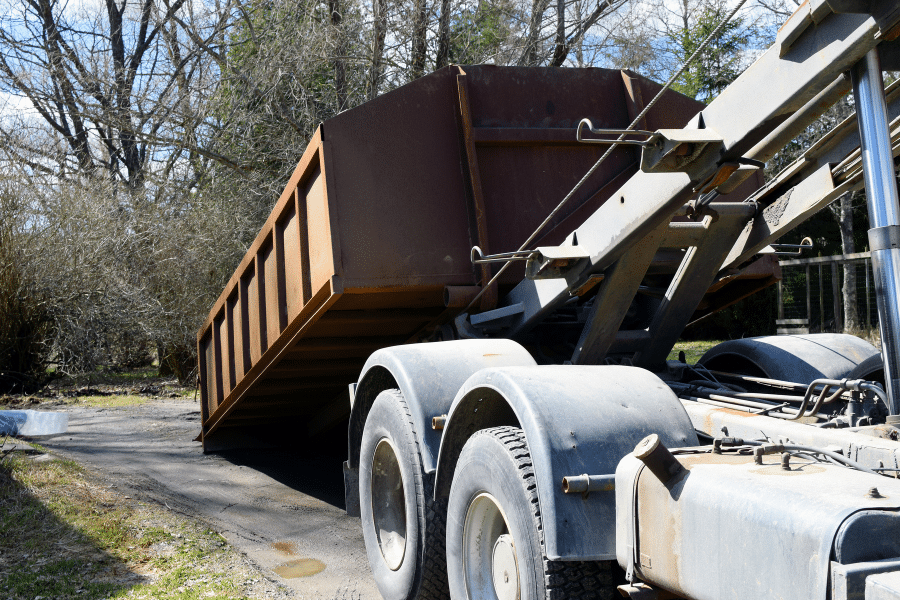
What Is A Roll Off Trailer?
A roll off trailer is a type of trailer that is used to transport large materials, equipment, or shipping containers. It’s equipped with a hydraulically-operated trailer bed that can be rolled or tilted back to aid in the unloading of these items. Thanks to this mechanism, extra tools like cranes or forklifts aren’t needed. If you’re working on a construction project or are in an industry where heavy lifting and transportation is required, a roll of trailer can make your job a lot easier.
What Is The Purpose Of A Roll Off Trailer?
The purpose of a roll off trailer is to eliminate the time and energy spent unloading oversized items. This trailer style allows you to expand the types of materials you’re able to include that would otherwise be difficult to unload. In addition, they’re able to make it through tight spaces and across uneven terrain, making it possible to transport to various locations. On top of all that, roll off trailers provide a cost-effective way to move these materials. They eliminate the need for additional heavy machinery, reduce labor costs, and lead to an increase in productivity.
How Much Do Roll Off Trailers Cost?
Roll off trailers can vary in price ranging from $10,000 to over $100,000 dollars. The cost of a roll off trailer depends on factors like size and capacity, its quality and brand, whether it’s new or used, features and customizations, and the current market conditions.
Larger trailers tend to sit on the higher end of that price range since they have a higher weight capacity compared to smaller ones. The brand name and quality of the roll off trailer can also increase its price. The more recognition a brand has for high-quality, durable trailers, the more it may cost.
If you’re looking for a lower-cost roll off trailer, consider buying a used one. It will save you money during the initial purchase and may be a better choice for a short-term job. While a new roll off trailer may be more costly, it may save you money in the long run. Additional benefits such as warranties provide assurance that your new trailer will remain in good condition for longer.
The features included with the roll of trailer may also affect price. Most roll off trailers are equipped with a basic hydraulic system that operates the trailer’s tilting or rolling mechanism. However, if you decide to upgrade or customize the hydraulic system to carry heavier loads this may entail a higher cost. Other customizable options such as advanced safety features may increase the price as well.
Market conditions such as demand and availability of materials can impact the price of roll of trailers. If there is high demand but limited supplies, the cost of the roll of trailers will go up. If there are lots of supplies but low demand, the price will go up.
When you start to look for roll off trailers for sale, be sure to have a budget in mind. These factors can help you determine how much the roll of trailer will cost and what purchasing decisions are right for you.
Roll Off Trailer Styles
As you begin your search for the roll off trailer that will best suit your needs, you may feel bombarded with all the different options. Let’s take a look at some common styles and see if one of these may be right for you.
Roll Off Dump Trailer
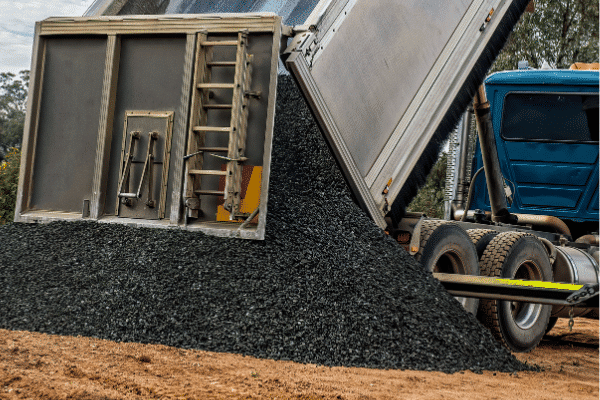
This style combines the capabilities of a hydraulic dump trailer with those of a traditional roll off trailer to unload the contents inside the container or dumpster. It operates like a dump truck, allowing you to raise one end resulting in the materials sliding out of the trailer and onto the ground. A roll off dump trailer may be the right choice for you if you’re not only looking to transport a container, but also unload its contents on the job site.
Roll Off Dumpster Trailer
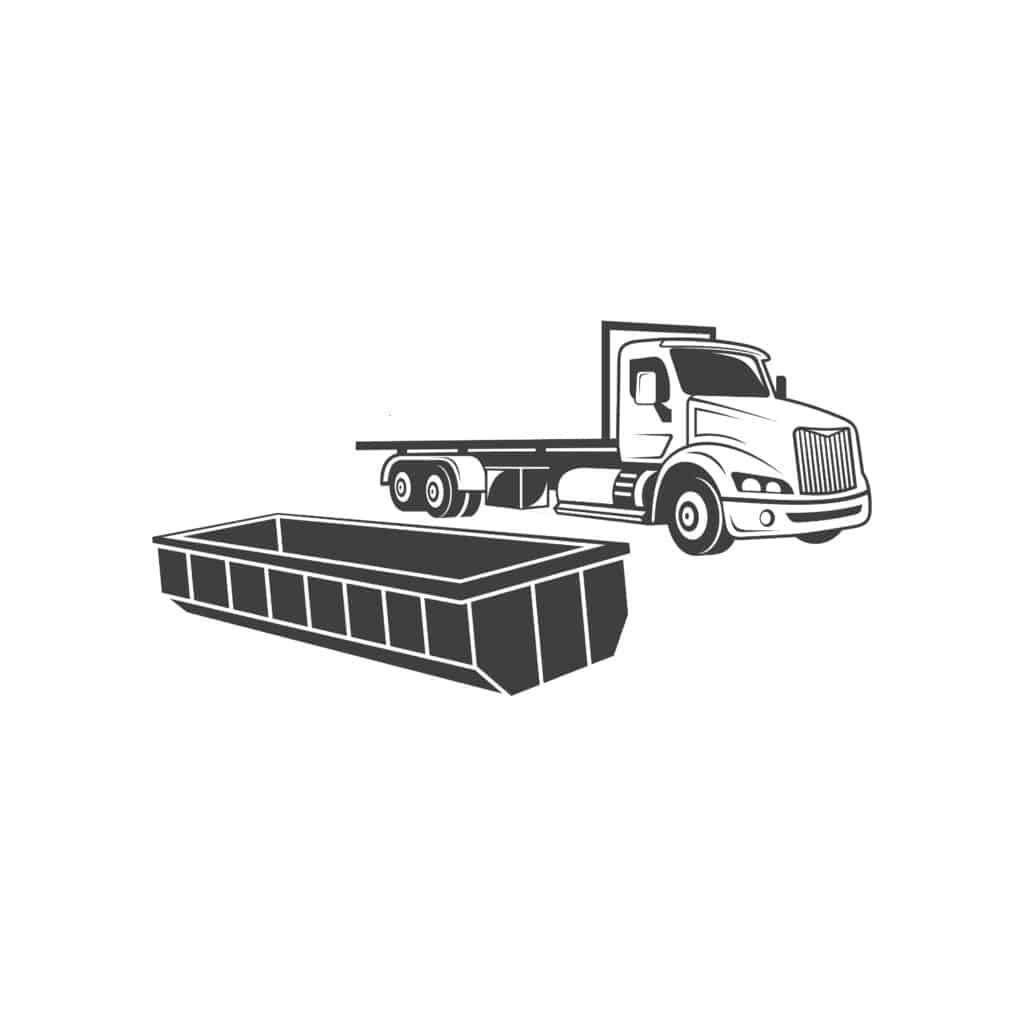
This refers to a style of roll off trailers that is designed especially for the loading and unloading of dumpsters. It’s typically a flatbed-style trailer with a hydraulic system to roll the dumpster on and off of the bed. A traditional roll off trailer may be a better option to transport a variety of materials, but this is a great choice when transporting a specific size or style of dumpster.
Hook Lift Roll Off Trailers
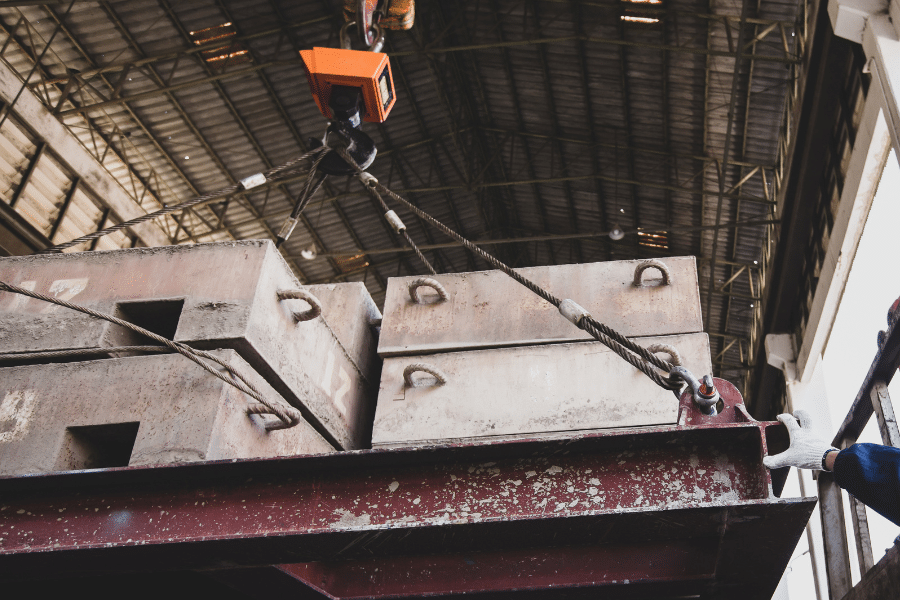
A hook lift trailer differs from the traditional roll off style by incorporating a hydraulic arm with hook attachment that can extend, retract and pivot to lift containers onto or off of the trailer bed. They can be used to transport a wider variety of containers such as roll off dumpsters, flatbeds, storage containers, and specialized equipment bins. If you’re looking to haul a broad range of container types, this may be better suited for your needs.
Flatbed Roll Off Trailer
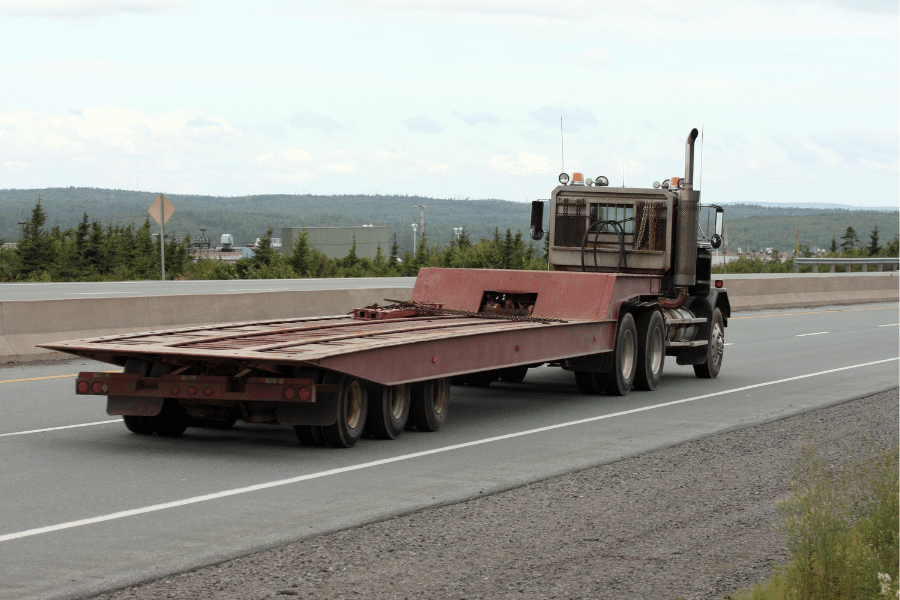
Traditional roll off trailers feature enclosed sides that may limit the size of the containers you’re able to haul. A flatbed trailer doesn’t include sides or walls, eliminating a potential obstacle during the loading and unloading process. For heavier loads that require more maneuverability, consider a flatbed style.
Gooseneck Roll Off Trailer
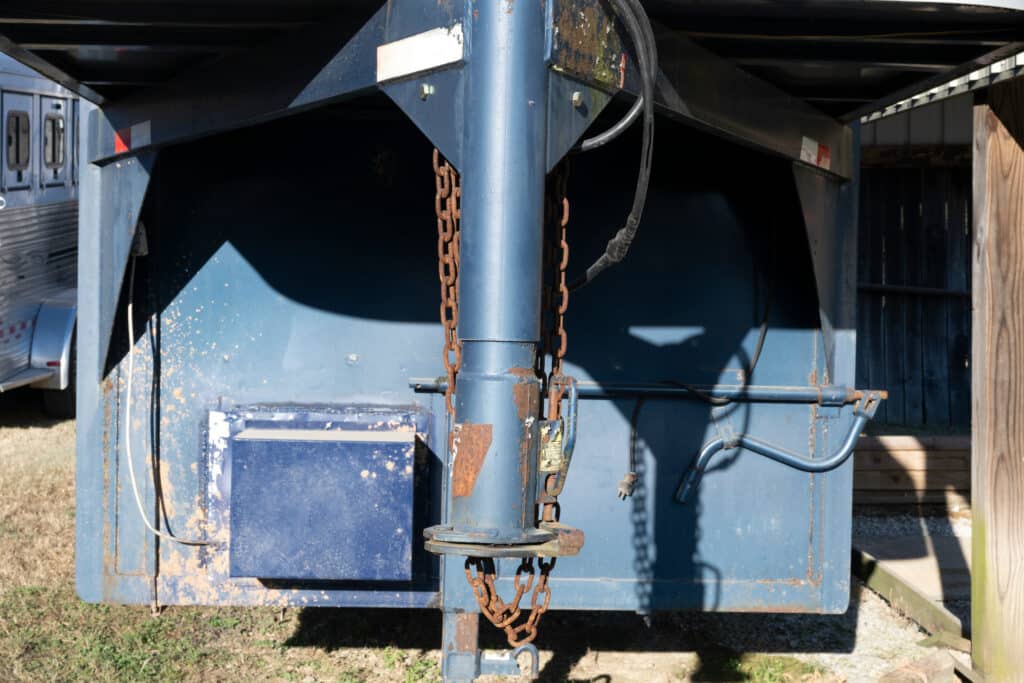
A gooseneck roll off trailer differs from the previous styles due to the specific style of hitch it uses. Unlike the hook lift trailer, the hitch on a gooseneck trailer extends over the bed of the towing trailer. This design allows for better weight distribution, stability, and maneuverability when towing heavy loads. For jobs that require heavier materials, towing over long distances, and navigating challenging terrain, gooseneck trailers may be better suited for your needs.
Cable Hoist Roll Off Trailer
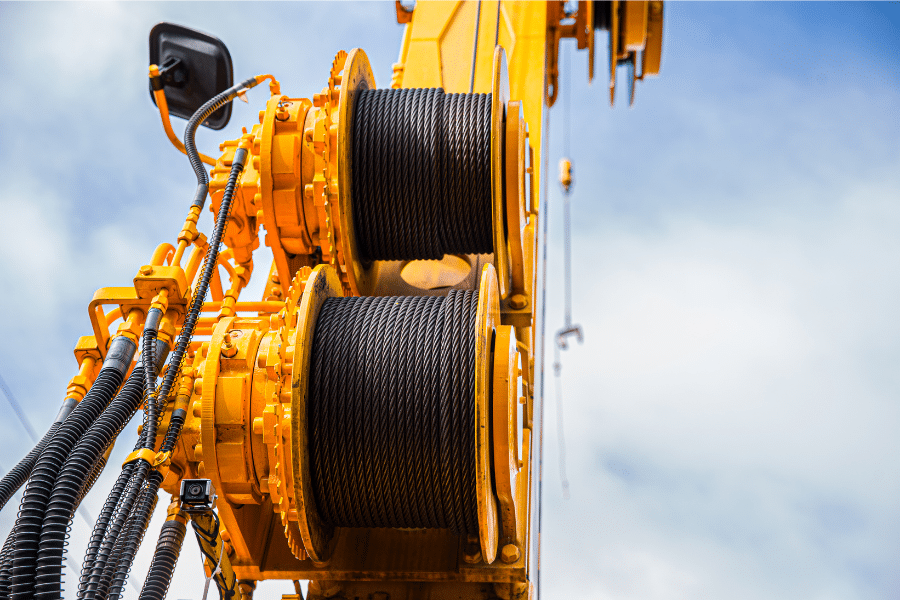
This trailer doesn’t incorporate a hydraulic system like the other styles of roll off trailers. Instead it employs a cable that’s attached to the roll-off container at one end and wrapped around a winch at the other. You can wind and unwind the cable using the winch in order to raise and lower the container onto or off of the trailer.
Tilt Frame Roll Off Trailer
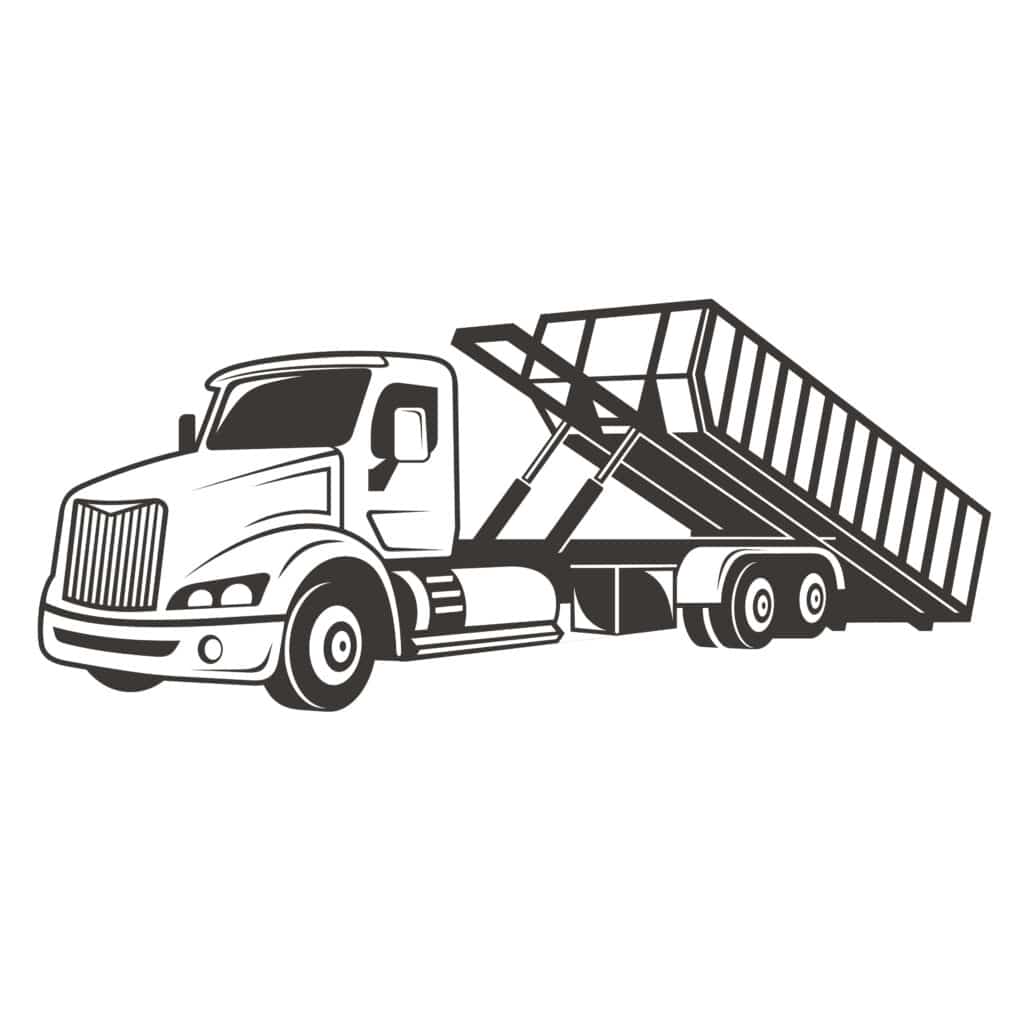
Similar to the roll off dump trailer, this features a tilting mechanism that raises the front end of the bed allowing the materials to slide onto the designated drop off area. However, it doesn’t empty the contents of the container. A tilt frame trailer is only used to drop off the container.
Slider Chassis Roll Off Trailer
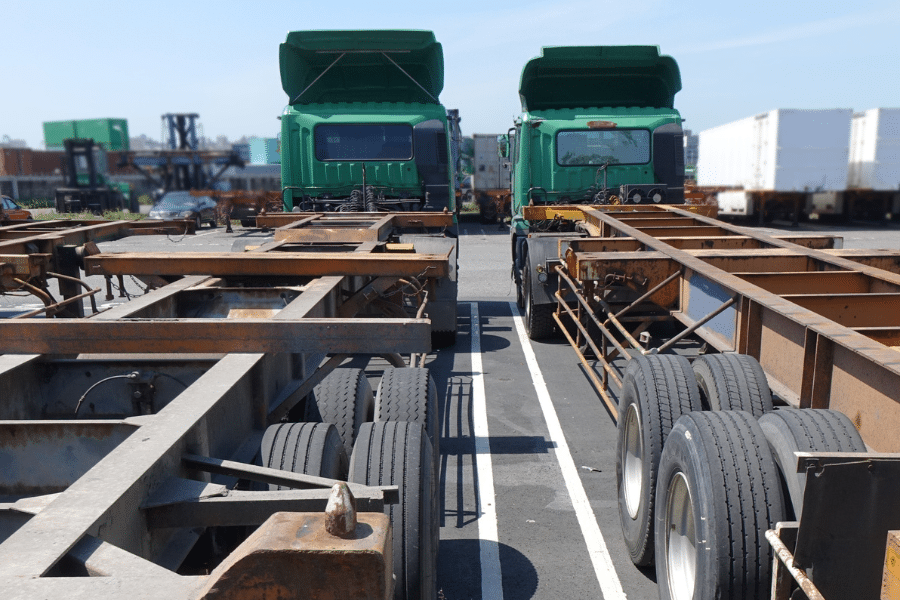
A slider chassis trailer features a sliding tandem axle assembly in which the rear axle or axles of the trailer move forward or backward along a track or slide mechanism. The ability to adjust the position of the rear axle allows you to control the distribution of weight and comply with axle weight regulations. Controlling the weight distribution also allows for flexibility in the sizes of cargo you’re able to transport.
Best Roll Off Trailer Brands
There are a number of roll off trailer brands to choose from. Each brand offers different features, capabilities, packages, and prices. Let’s take a look at some of the most popular brands:
Benlee
Benlee is a manufacturer of roll off trailers, roll off trucks, and other equipment used in waste management. They’re often praised for their durability and reliability. Their high-strength steel frames allow them to transport heavy loads and withstand harsh working conditions. With proper care and maintenance, a Benlee trailer can last a long time.
Galbreath
Galbreath offers many different styles of roll off trailer styles with varying capacities, lengths, and configurations that allow you to transport a variety of loads. Their advanced hydraulic systems, safety features, and ease of maintenance ensure ease in transportation and a roll off trailer that will stand the test of time.
Dragon Products
This brand is known for its products in the waste management industry. Not only do they offer trailers designed to transport various container sizes and types, but they also offer containers to transport waste. Like the other brands mentioned, they have advanced hydraulic systems, safety features, and are easy to maintain, making your job easier.
Clement
Clement is the only brand on this list to feature a frameless roll off trailer. Without the frame, the body of the truck is the primary load-bearing structure, eliminating the need for a separate frame. A frameless trailer can reduce weight, improve stability, and simplify maintenance. This opens the frameless roll off trailer up to many different sizes and styles of loads.
Galfab
This brand of roll off trailers offers a variety of styles such as cable hoist and hook lift. Its innovative hydraulic system is designed for smooth operation and precise control making loading and unloading more efficient. These high quality trailers are well-known for meeting the needs of professionals.
Roll Off Trailer vs Truck
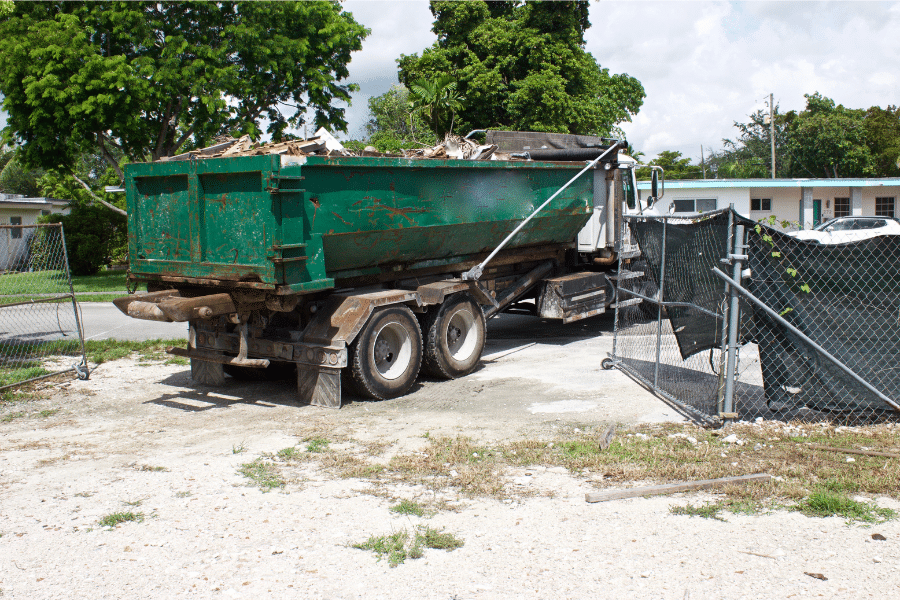
Depending on the type of job you’re doing or the tools you have available to you, you may choose either a roll off trailer or truck. A roll off trailer is a separate attachment that is towed by a heavy-duty vehicle. A roll off truck offers the ability to haul a container all in one vehicle. You may consider using a roll off trailer when hauling a long distance or transporting multiple containers simultaneously. Trailers can be useful if you want to leave the trailer at the job site and free up the vehicle for other uses. On the other hand, roll off trucks are better for shorter hauls that require frequent loading and unloading.
Roll Off Trailer Parts
It may be confusing to understand what makes a roll off trailer different from other trailers. There are several key components that set it apart in its ability to simplify the loading, unloading, and transportation of containers. Here are the main trailer parts and accessories that make up the roll off style:
Hydraulic Lift System
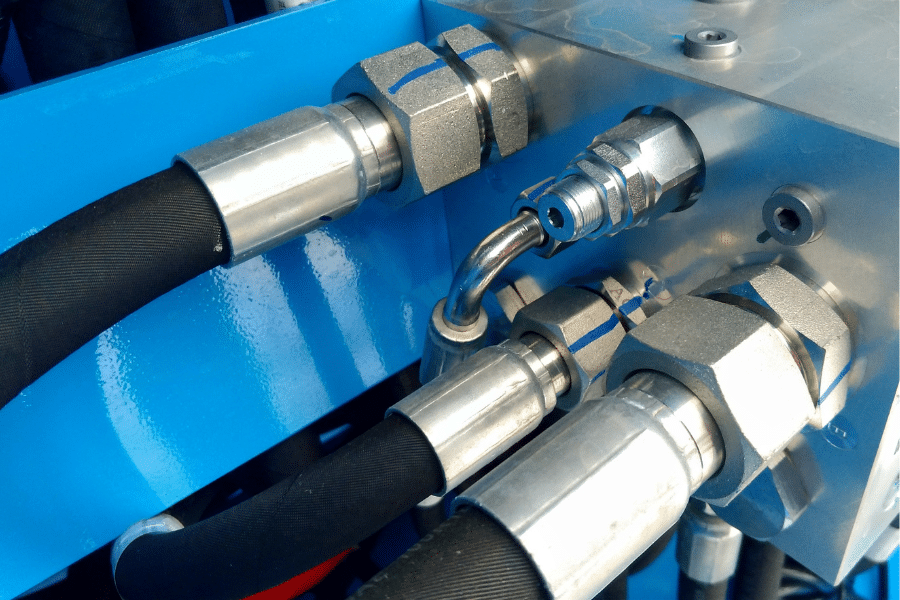
What sets a roll off trailer apart from other trailers is its hydraulic system that powers its loading and unloading capabilities. This system consists of hydraulic cylinders, hoses, pumps, and control valves that work together to lift, tilt, and lower the bed.
Safety Features
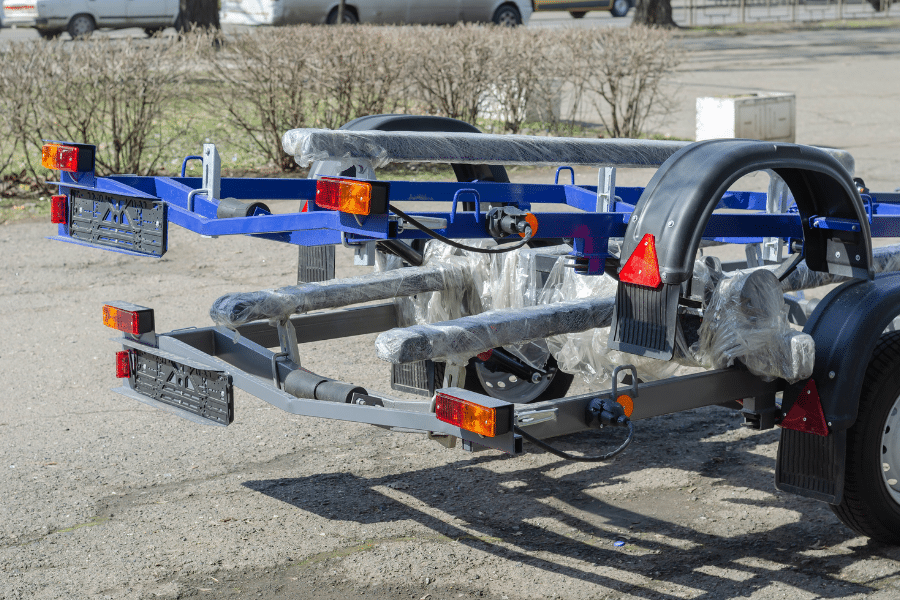
Roll off trailers are equipped with various features to ensure safe operation. These may include brake systems, trailer lights, reflectors, and a container locking mechanism. This mechanism may include locks, pins, or hooks to secure the container to the trailer bed, preventing it from falling off or shifting. Consider additional features such as LED trailer lights to enhance the safety of your roll off trailer.
Axles, Wheels And Tires
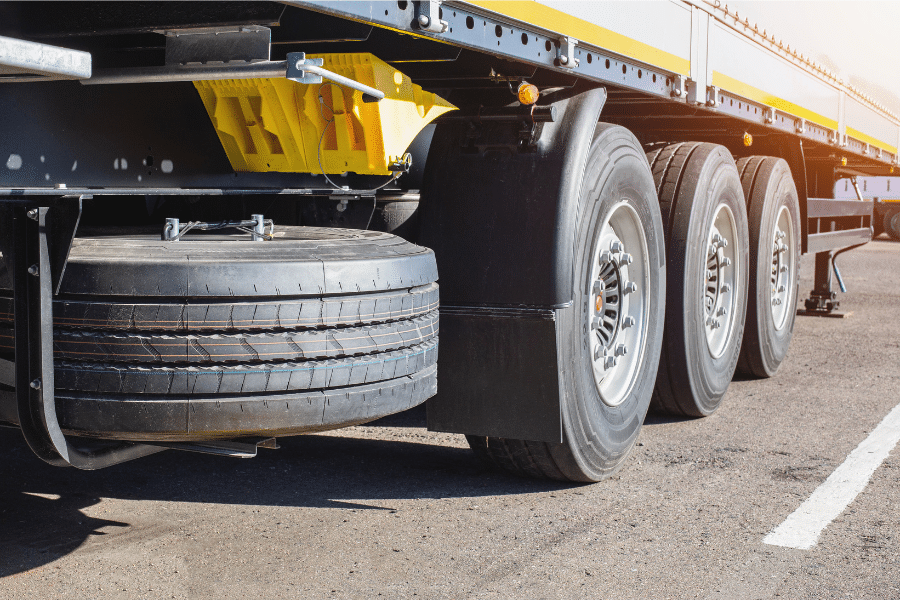
The trailer wheels and tires, as well as the axle, are in place to support the trailer’s weight and allow it to be towed. The number and configuration of axles may depend on the trailer’s size or weight capacity.
Roll Off Trailer Frame
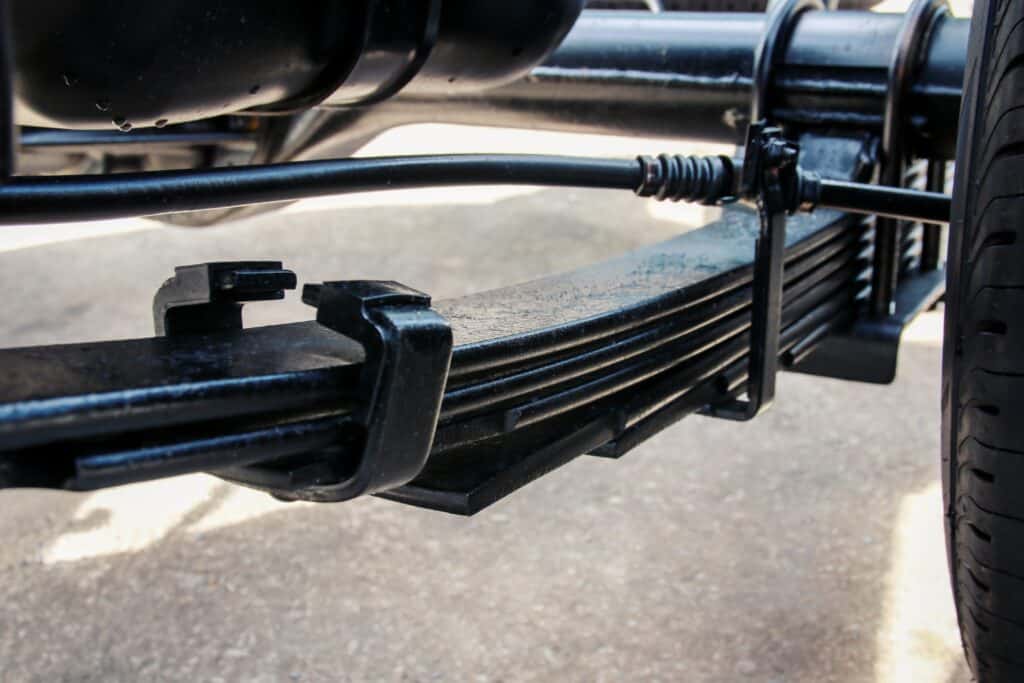
The frame is the backbone of the trailer. It provides support for the other components of the trailer and ensures its stability and integrity.
Roll Off Trailer Bed
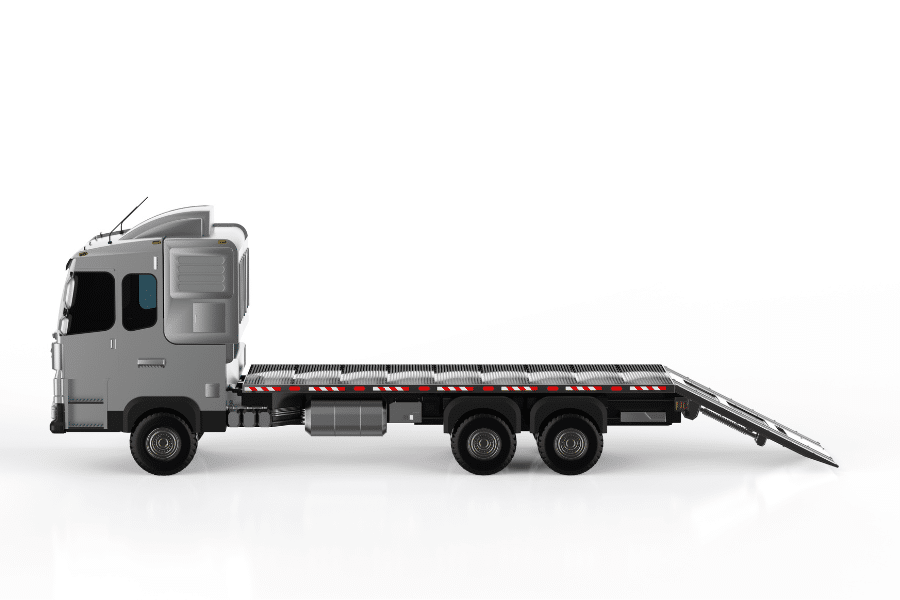
The roll off trailer bed is the flat surface on which the haul is loaded and secured. It’s often constructed with heavy-duty steel to support the weight of loaded containers.
Landing Gear
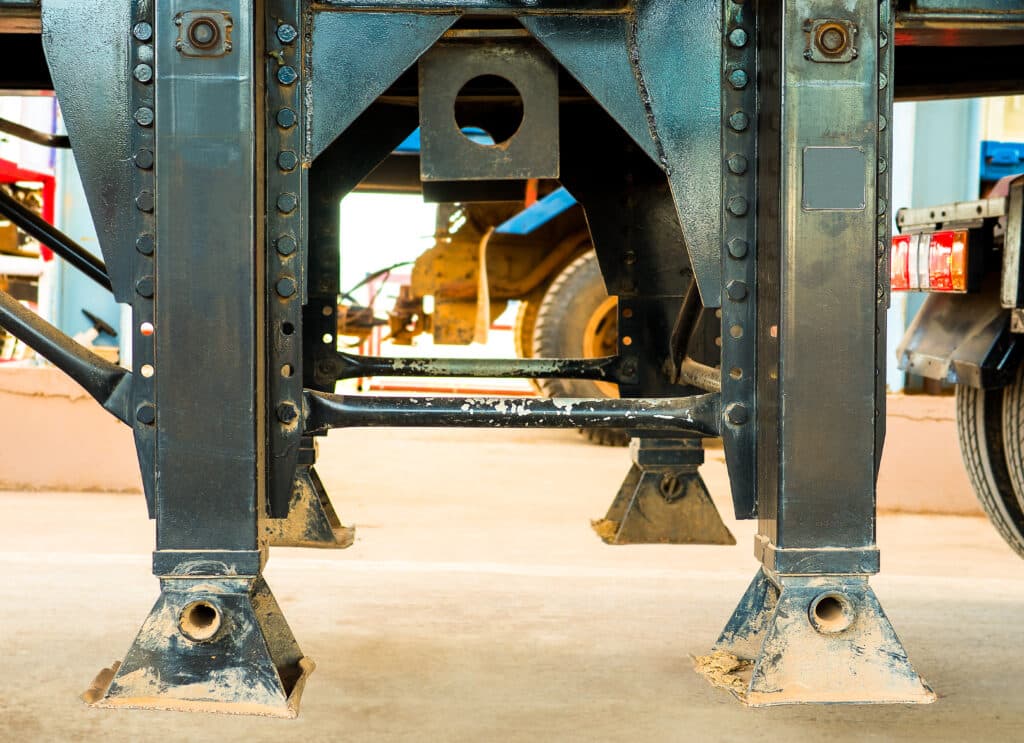
When detaching the trailer from the towing vehicle, it has retractable legs on the front that can be used to stabilize it. This gear ensures that the trailer remains stable and level during loading and unloading.
What Is A Roll Off Trailer Package?
A roll off trailer package refers to a comprehensive offering by a manufacturer or dealer that includes additional components, accessories and services to meet your needs. In addition to the roll off trailer and all its parts, the manufacturer may include containers, accessories such as spare tires, installation and training, as well as warranty and support services. Check and see what is included in the package before making a purchase.
Common Roll Off Trailer Sizes
Roll-off trailers are used to carry containers of a variety of sizes and weights. There are a number of different trailer sizes to choose from to accommodate these containers. Sizes are typically classified by length and capacity. It’s important to know the trailer weight and size to select the right one for the job. These are some common sizes:
20-Foot Roll Off Trailer
This is a good size for smaller loads. It can carry containers up to 20 feet in length and can handle a moderate weight capacity. This ranges from loads weighing 10 to 20 tons (20,000 to 40,000 pounds).
24-Foot Roll Off Trailer
This is slightly longer than a 20-foot trailer and can handle medium-sized jobs. It can carry containers 24 feet in length and handle more weight than a 20-foot trailer. Its weight capacity includes loads of 20 to 30 tons (40,000 to 60,000 pounds).
30-Foot Roll Off Trailer
This size can handle longer containers and hold more weight than the 24-foot trailer. A 30-foot trailer is a great choice for larger construction projects or waste management tasks. It’s capable of carrying hauls that range from 30 to 40 tons (60,000 to 80,000 pounds).
40-Foot Roll Off Trailer
This is one of the largest options available. It can haul oversized containers and heavy loads, making it great for large-scale construction projects, demolition sites, or waste management tasks. Loads can range from 40 to 50 tons (80,000 to 10,000 pounds).
If you want to purchase a trailer, we offer various options that may fit your needs.
